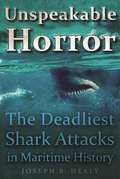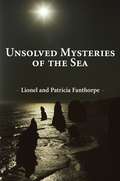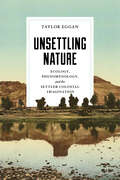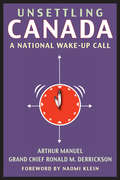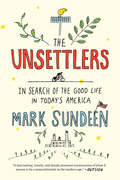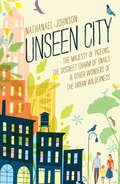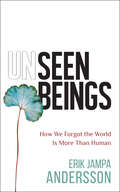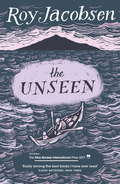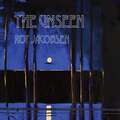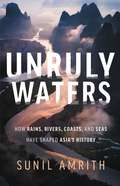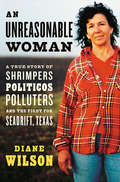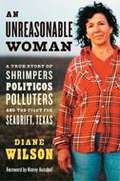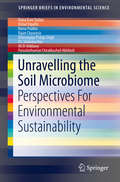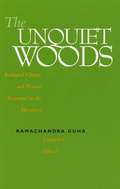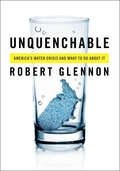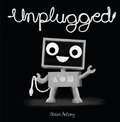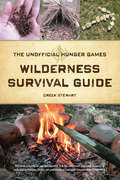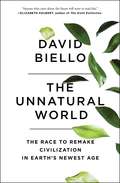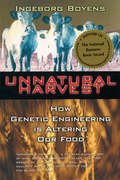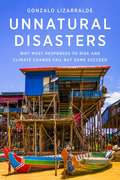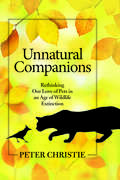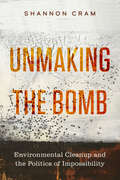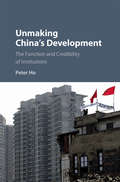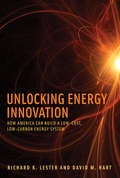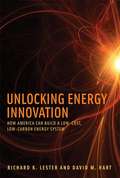- Table View
- List View
Unspeakable Horror: The Deadliest Shark Attacks in Maritime History
by Joseph B. HealyThe story of the USS Indianapolis is well-known. After delivering crucial components of the atomic bomb that would level Hiroshima in 1945, the Indianapolis was sunk by a Japanese submarine in the South China Sea. Of the nearly 1,200 men aboard, 900 survived the torpedoing, spilling into the sea. White tip sharks began attacking the next morning and after four days only 300 sailors were alive to rescue. Less famous are the many stories of ships sinking in shark-infested waters with gruesome results. Such as the Cape San Juan, a US troop transport ship that was torpedoed by a Japanese submarine in the Pacific Ocean near the Fiji Islands; nearly 700 of the survivors were killed by sharks. Or the HMS Birkenhead, which sunk off Danger Point, South Africa, in 1852, resulting in 440 shark-related fatalities. In 1927, the luxury Italian cruise liner Principessa Maldafa sank ninety miles off the coast of Albrohos Island while heading to Porto Seguro, Brazil. Nearly 300 who survived the wreck were killed by sharks. In 1909, the French steamer La Seyne collided with British India Steamship Co. liner Onda near Singapore, twenty-six miles from land. One hundred and one people were eventually killed by sharks. In the water, human intelligence is no match for a shark’s brutal, destructive instincts. Sharks are born to kill and eat: They detect distress, smell blood—and attack. Marine disasters such as those above result in humans becoming prey, floating in inner space as shadowy sharks swim below, ready to attack. Helpless to save yourself—floating and waiting, watching the malevolent creatures circle, knowing what will happen . . . a sudden swirl of water, a cloud of blood, the searing pain . . . until there is no more. This is unspeakable horror
Unsolved Mysteries of the Sea
by Lionel And FanthorpeSeas and oceans cover most of the Earth’s surface, yet we know less about what lies beneath them than we do about stars and planets millions of miles away. The seas are filled with intriguing mysteries: How were they formed? What gave rise to stories of sirens, mermaids, and mermen? Where did the old pirates and buccaneers hide their treasure? The answers to these questions and more can be found in Unsolved Mysteries of the Sea.
Unsettling Nature: Ecology, Phenomenology, and the Settler Colonial Imagination (Under the Sign of Nature)
by Taylor EgganThe German poet and mystic Novalis once identified philosophy as a form of homesickness. More than two centuries later, as modernity’s displacements continue to intensify, we feel Novalis’s homesickness more than ever. Yet nowhere has a longing for home flourished more than in contemporary environmental thinking, and particularly in eco-phenomenology. If only we can reestablish our sense of material enmeshment in nature, so the logic goes, we might reverse the degradation we humans have wrought—and in saving the earth we can once again dwell in the nearness of our own being. Unsettling Nature opens with a meditation on the trouble with such ecological homecoming narratives, which bear a close resemblance to narratives of settler colonial homemaking. Taylor Eggan demonstrates that the Heideggerian strain of eco-phenomenology—along with its well-trod categories of home, dwelling, and world—produces uncanny effects in settler colonial contexts. He reads instances of nature’s defamiliarization not merely as psychological phenomena but also as symptoms of the repressed consciousness of coloniality. The book at once critiques Heidegger’s phenomenology and brings it forward through chapters on Willa Cather, D. H. Lawrence, Olive Schreiner, Doris Lessing, and J. M. Coetzee. Suggesting that alienation may in fact be "natural" to the human condition and hence something worth embracing instead of repressing, Unsettling Nature concludes with a speculative proposal to transform eco-phenomenology into "exo-phenomenology"—an experiential mode that engages deeply with the alterity of others and with the self as its own Other.
Unsettling Canada: A National Wake-Up Call
by Naomi Klein Arthur Manuel Grand Chief Grand Chief DerricksonUnsettling Canada is built on a unique collaboration between two First Nations leaders, Arthur Manuel and Grand Chief Ron Derrickson.Both men have served as chiefs of their bands in the B.C. interior and both have gone on to establish important national and international reputations. But the differences between them are in many ways even more interesting. Arthur Manuel is one of the most forceful advocates for Aboriginal title and rights in Canada and comes from the activist wing of the movement. Grand Chief Ron Derrickson is one of the most successful Indigenous businessmen in the country.Together the Secwepemc activist intellectual and the Syilx (Okanagan) businessman bring a fresh perspective and new ideas to Canada’s most glaring piece of unfinished business: the place of Indigenous peoples within the country’s political and economic space. The story is told through Arthur’s voice but he traces both of their individual struggles against the colonialist and often racist structures that have been erected to keep Indigenous peoples in their place in Canada.In the final chapters and in the Grand Chief’s afterword, they not only set out a plan for a new sustainable indigenous economy, but lay out a roadmap for getting there.
The Unsettlers: In Search of the Good Life in Today's America
by Mark SundeenThe radical search for the simple life in today’s America. On a frigid April night, a classically trained opera singer, five months pregnant, and her husband, a former marine biologist, disembark an Amtrak train in La Plata, Missouri, assemble two bikes, and pedal off into the night, bound for a homestead they've purchased, sight unseen. Meanwhile, a horticulturist, heir to the Great Migration that brought masses of African Americans to Detroit, and her husband, a product of the white flight from it, have turned to urban farming to revitalize the blighted city they both love. And near Missoula, Montana, a couple who have been at the forefront of organic farming for decades navigate what it means to live and raise a family ethically. A work of immersive journalism steeped in a distinctively American social history and sparked by a personal quest, The Unsettlers traces the search for the simple life through the stories of these new pioneers and what inspired each of them to look for -- or create -- a better existence. Captivating and clear-eyed, it dares us to imagine what a sustainable, ethical, authentic future might actually look like.From the Hardcover edition.
Unseen City: The Majesty of Pigeons, the Discreet Charm of Snails & Other Wonders of the Urba n Wilderness
by Nathanael JohnsonIt all started with Nathanael Johnson’s decision to teach his daughter the name of every tree they passed on their walk to day care in San Francisco. This project turned into a quest to discover the secrets of the neighborhood’s flora and fauna, and yielded more than names and trivia: Johnson developed a relationship with his nonhuman neighbors.Johnson argues that learning to see the world afresh, like a child, shifts the way we think about nature: Instead of something distant and abstract, nature becomes real—all at once comical, annoying, and beautiful. This shift can add tremendous value to our lives, and it might just be the first step in saving the world.No matter where we live—city, country, oceanside, or mountains—there are wonders that we walk past every day. Unseen City widens the pinhole of our perspective by allowing us to view the world from the high-altitude eyes of a turkey vulture and the distinctly low-altitude eyes of a snail. The narrative allows us to eavesdrop on the comically frenetic life of a squirrel and peer deep into the past with a ginkgo biloba tree. Each of these organisms has something unique to tell us about our neighborhoods and, chapter by chapter, Unseen City takes us on a journey that is part nature lesson and part love letter to the world’s urban jungles. With the right perspective, a walk to the subway can be every bit as entrancing as a walk through a national park.
Unseen Beings: How We Forgot the World Is More Than Human
by Erik Jampa Andersson'Unseen Beings is a magnificent, passionate, brilliantly written manifesto for our urgent reimagining of our relationship with every aspect of the creation… indispensable reading for anyone who longs for a just and balanced human future. Buy it and give it to everyone you know.' Andrew Harvey, author of The Hope A revolutionary perspective on the climate catastrophe bridging history, philosophy, science, and religion.You&’ve heard the hard-hitting data and you&’ve seen the documentaries. But what will it truly take for humanity to change? We will not tackle the climate catastrophe with data alone – we need new stories and new ways of seeing and thinking.By drawing on traditional eco-philosophies and Buddhist wisdom, Erik Jampa Andersson offers an approach to our environmental emergency that will make us rethink the very nature of our existence on this incredible planet. Looking at the climate catastrophe through the framework of disease, Unseen Beings examines our ecological diagnosis, its historical causes and conditions and, crucially, its much-needed treatment, as well as exploring:how and why we constructed a human-centric worldview amazing recent discoveries around non-human intelligencehow religious traditions have dealt with questions of nature, sentience and ecologycritical connections between human health and environmental healthThis book is a call to action. Climate anxiety has left many of us feeling confused and powerless, but there is another way. If we can recover our natural sense of enchantment and kinship with non-human beings, we may still find a path to build a better future.
The Unseen: SHORTLISTED FOR THE MAN BOOKER INTERNATIONAL PRIZE 2017
by Roy JacobsenShortlisted for the Man Booker International Prize and the Dublin Literary Award"An absolute masterpiece. Packed with understated emotion, stunning from beginning to end" Courttia Newland, author of A River Called Time"A masterful and moving work of literature" Kiran Millwood Hargrave, author of The Mercies"Easily among the best books I have ever read" Eileen Battersby, Irish Times"A beautifully crafted novel . . . Quite simply a brilliant piece of work" Charlie Connolly, New European"A blunt, brilliant book" Tom Graham, Financial TimesNobody can leave an island. An island is a cosmos in a nutshell, where the stars slumber in the grass beneath the snow. But occasionally someone tries . . . Ingrid Barrøy is born on an island that bears her name - a holdfast for a single family, their livestock, their crops, their hopes and dreams.Her father dreams of building a quay that will connect them to the mainland, but closer ties to the wider world come at a price. Her mother has her own dreams - more children, a smaller island, a different life - and there is one question Ingrid must never ask her.Island life is hard, a living scratched from the dirt or trawled from the sea, so when Ingrid comes of age, she is sent to the mainland to work for one of the wealthy families on the coast.But Norway too is waking up to a wider world, a modern world that is capricious and can be cruel. Tragedy strikes, and Ingrid must fight to protect the home she thought she had left behind.Translated from the Norwegian by Don Bartlett and Don Shaw
The Unseen: SHORTLISTED FOR THE MAN BOOKER INTERNATIONAL PRIZE 2017
by Roy JacobsenBarrøy Island off the North-western coast of Norway - a holdfast for a single family, their livestock, their crops, their hopes and dreams. And their fears. There is a taint passed down the Barrøy line, and Hans and Maria Barrøy fear their daughter Ingrid may be affected. The early years of the twentieth century prove that Norway cannot stand apart from the wider world - no more than Barrøy island can remain at a remove from the rest of Norway. Hans Barrøy decides to build a quay so that his family can be properly connected to the mainland and with neighbouring islands. In time, Ingrid is sent to serve with one of the rich families on the coast, caring for their two children. But when tragedy strikes - twice in quick succession - she finds herself responsible not only for two newly orphaned children, but for Barrøy Island itself. If they are to survive, she and the other young must learn how to tame this remote earthly paradise for themselves.(P)2016 W F Howes Ltd
Unruly Waters: How Rains, Rivers, Coasts, and Seas Have Shaped Asia's History
by Sunil AmrithFrom a MacArthur "Genius," a bold new perspective on the history of Asia, highlighting the long quest to tame its watersAsia's history has been shaped by her waters. In Unruly Waters, historian Sunil Amrith reimagines Asia's history through the stories of its rains, rivers, coasts, and seas--and of the weather-watchers and engineers, mapmakers and farmers who have sought to control them. Looking out from India, he shows how dreams and fears of water shaped visions of political independence and economic development, provoked efforts to reshape nature through dams and pumps, and unleashed powerful tensions within and between nations.Today, Asian nations are racing to construct hundreds of dams in the Himalayas, with dire environmental impacts; hundreds of millions crowd into coastal cities threatened by cyclones and storm surges. In an age of climate change, Unruly Waters is essential reading for anyone seeking to understand Asia's past and its future.
An Unreasonable Woman
by Diane WilsonWhen Diane Wilson, fourth-generation shrimp-boat captain and mother of five, learns that she lives in the most polluted county in the United States, she decides to fight back. She launches a campaign against a multibillion-dollar corporation that has been covering up spills, silencing workers, flouting the EPA, and dumping lethal ethylene dichloride and vinyl chloride into the bays along her beloved Texas Gulf Coast. In an epic tale of bravery, Wilson takes her fight to the courts, to the gates of the chemical plant, and to the halls of power in Austin. Along the way she meets with scorn, bribery, character assassination, and death threats. Finally Wilson realizes that she must break the law to win justice: She resorts to nonviolent disobedience, direct action, and hunger strikes. Wilson's vivid South Texas dialogue resides somewhere between Alice Walker and William Faulkner, and her dazzling prose brings to mind the magic realism of Gabriel Garcia Marquez, replete with dreams and prophecies.
An Unreasonable Woman: A True Story of Shrimpers, Políticos, Polluters, and the Fight for Seadrift, Texas
by Diane WilsonFor her activism on behalf of Texas Gulf Coast bays, Wilson has been recognized with awards including Mother Jones' Hellraiser of the Month. In her first book, this fourth-generation shrimper relates her battles against a plastics company (and their political allies) whose dumping of toxic chemicals resulted in her county's designation as the nation's most polluted in the late 1980s. Annotation ©2005 Book News, Inc., Portland, OR (booknews.com)
Unravelling the Soil Microbiome: Perspectives For Environmental Sustainability (SpringerBriefs in Environmental Science)
by Rama Kant Dubey Vishal Tripathi Ratna Prabha Rajan Chaurasia Dhananjaya Pratap Singh Ch. Srinivasa Rao Ali El-Keblawy Purushothaman Chirakkuzhyil AbhilashThis book explores the significance of soil microbial diversity to understand its utility in soil functions, ecosystem services, environmental sustainability, and achieving the sustainable development goals. With a focus on agriculture and environment, the book highlights the importance of the microbial world by providing state-of-the-art technologies for examining the structural and functional attributes of soil microbial diversity for applications in healthcare, industrial biotechnology, and bioremediation studies. In seven chapters, the book will act as a primer for students, environmental biotechnologists, microbial ecologists, plant scientists, and agricultural microbiologists. Chapter 1 introduces readers to the soil microbiome, and chapter 2 discusses the below ground microbial world. Chapter 3 addresses various methods for exploring microbial diversity, chapter 4 discusses the genomics methods, chapter 5 provides the metaproteomics and metatranscriptomics approaches and chapter 6 details the bioinformatics tools for soil microbial community analysis, and chapter 7 concludes the text with future perspectives on further soil microbial uses and applications.
The Unquiet Woods: Ecological Change and Peasant Resistance in the Himalaya
by Ramachandra GuhaThe Unquiet Woods, Ramachandra Guha's path breaking study of peasant movements against commercial forestry, offers a new epilogue that brings the story of Himalayan social protest up-to-date, reflecting the Chipko movement's continuing influence in the wider world.
Unquenchable: America's Water Crisis and What To Do About It
by Robert Jerome GlennonIn the middle of the Mojave Desert, Las Vegas casinos use billions of gallons of water for fountains, pirate lagoons, wave machines, and indoor canals. Meanwhile, the town of Orme, Tennessee, must truck in water from Alabama because it has literally run out. Robert Glennon captures the irony--and tragedy--of America's water crisis in a book that is both frightening and wickedly comical. From manufactured snow for tourists in Atlanta to trillions of gallons of water flushed down the toilet each year, Unquenchable reveals the heady extravagances and everyday inefficiencies that are sucking the nation dry. The looming catastrophe remains hidden as government diverts supplies from one area to another to keep water flowing from the tap. But sooner rather than later, the shell game has to end. And when it does, shortages will threaten not only the environment, but every aspect of American life: we face shuttered power plants and jobless workers, decimated fi sheries and contaminated drinking water. We can't engineer our way out of the problem, either with traditional fixes or zany schemes to tow icebergs from Alaska. In fact, new demands for water, particularly the enormous supply needed for ethanol and energy production, will only worsen the crisis. America must make hard choices--and Glennon's answers are fittingly provocative. He proposes market-based solutions that value water as both a commodity and a fundamental human right. One truth runs throughout Unquenchable: only when we recognize water's worth will we begin to conserve it.
Unplugged
by Steve AntonyA delightful picture book about the wonders of all the fun you can have inside AND outside, by the award-winning Steve Antony, author of the bestselling Please Mr Panda.BLIP spends all day plugged into her computer, playing games and having fun. But when there is a POWER CUT, Blip goes down the stairs and out the front door, where she discovers playing games and having fun . . . OUTSIDE. Isn't it wonderful to be UNPLUGGED? By Steve Antony, winner of the Oscar's First Book Prize, nominated for the Kate Greenaway Medal and shortlisted for the Waterstone's Children's Book Prize."[A] gorgeous piece of propaganda for going outside." & "[T]he book is so elegantly illustrated and cleverly conceived."
The Unofficial Hunger Games Wilderness Survival Guide: A Wilderness Skills Manual For Surviving The Arena
by Creek StewartPut the Odds in Your Favor! Train like a Tribute before you enter the Arena using this wilderness survival guide--you don't have to live in Panem to put these survival skills to use. Experience the adventure of life in District 12 by learning and practicing the survival skills used by Katniss, Peeta, Gale and their friends. Some of the survival skills you'll learn: Building temporary shelters to protect from rain, cold, wind and sun. Finding and purifying water--even when there are no streams or lakes nearby. Building and using fire for cooking, signaling, warmth and making tools. Identifying and cooking wild edible plants. Building Gale's famous twitch-up snares. Peeta's camouflage techniques. Katniss's hunting and stalking skills. Making your own survival bow and arrows and other tools. The materials you need to create a forage bag like Katniss's. Survival first aid. Navigation tips and tricks for travel, rescue and evasion. Detailed photos and step-by-step instructions will help you master each skill. The real-life skills found in The Unofficial Hunger Games Wilderness Survival Guide will help you in any wilderness or disaster survival situation. Start your training today.
The Unnatural World: The Race to Remake Civilization in Earth's Newest Age
by David BielloWith the historical perspective of The Song of the Dodo and the urgency of Al Gore's An Inconvenient Truth, a brilliant young environmental journalist argues that we must innovate and adapt to save planet Earth.Civilization is in crisis, facing disasters of our own making on the only planet known to bear life in the vast void of the universe. We have become unwitting gardeners of the Earth, not in control, but setting the conditions under which all of life flourishes--or not. Truly, it's survival of the innovators. The Unnatural World chronicles a disparate band of unlikely heroes: an effervescent mad scientist who would fertilize the seas; a pigeon obsessive bent on bringing back the extinct; a low-level government functionary in China doing his best to clean up his city, and more. These scientists, billionaires, and ordinary people are all working toward saving the best home humanity is ever likely to have. What is the threat? It is us. In a time when a species dies out every ten minutes, when summers are getting hotter, winters colder, and oceans higher, some people still deny mankind's effect on the Earth. But all of our impacts on the planet have ushered in what qualifies as a new geologic epoch, thanks to global warming, mass extinction, and such technologies as nuclear weapons or plastics. The Unnatural World examines the world we have created and analyzes the glimmers of hope emerging from the efforts of incredible individuals seeking to change our future. Instead of a world without us, this history of the future shows how to become good gardeners, helping people thrive along with an abundance of plants, animals, all the exuberant profusion of life on Earth--a better world with us. The current era of humans need not be the end of the world--it's just the end of the world as we know it.
Unnatural Harvest: How Genetic Engineering is Altering Our Food
by Ingeborg BoyensAdvertisers may want us to believe that our food is produced on picturesque farms, but the cold reality is that the plants and animals we consume may be the result of genetic engineering in the laboratories of multinational corporations.Biotechnology brings with it implications for human and animal health, the threat of environmental damage, a possible redefining of our global food system and a Pandora's box of ethical questions. But the consuming public remains virtually unaware of the genetic alterations of their food and what that may hold in store.Thoroughly researched and accessibly written, Unnatural Harvest holds nothing back in telling us how the food we now serve ourselves and our children may be altered and why we should be very concerned.
Unnatural Disasters: Why Most Responses to Risk and Climate Change Fail but Some Succeed
by Gonzalo LizarraldeStorms, floods, fires, tsunamis, earthquakes, tornadoes, and other disasters seem not only more frequent but also closer to home. As the world faces this onslaught, we have placed our faith in “sustainable development,” which promises that we can survive and even thrive in the face of climate change and other risks. Yet while claiming to “go green,” we have instead created new risks, continued to degrade nature, and failed to halt global warming.Unnatural Disasters offers a new perspective on our most pressing environmental and social challenges, revealing the gaps between abstract concepts like sustainability, resilience, and innovation and the real-world experiences of people living at risk. Gonzalo Lizarralde explains how the causes of disasters are not natural but all too human: inequality, segregation, marginalization, colonialism, neoliberalism, racism, and unrestrained capitalism. He tells the stories of Latin American migrants, Haitian earthquake survivors, Canadian climate activists, African slum dwellers, and other people resisting social and environmental injustices around the world. Lizarralde shows that most reconstruction and risk-reduction efforts exacerbate social inequalities. Some responses do produce meaningful changes, but they are rarely the ones powerful leaders have in mind.This book reveals how disasters have become both the causes and consequences of today’s most urgent challenges and proposes achievable solutions to save a planet at risk, emphasizing the power citizens hold to change the current state of affairs.
Unnatural Companions: Rethinking Our Love of Pets in an Age of Wildlife Extinction
by Peter Christie"Highly compelling...page-turning read" — TNC's Cool Green ScienceWe love our pets. Dogs, cats, birds, reptiles, and other species have become an essential part of more families than ever before—in North America today, pets outnumber people. Pet owners are drawn to their animal companions through an innate desire to connect with other species. But there is a dark side to our domestic connection with animal life: the pet industry is contributing to a global conservation crisis for wildlife—often without the knowledge of pet owners. In Unnatural Companions, journalist Peter Christie issues a call to action for pet owners. If we hope to reverse the alarming trend of wildlife decline, pet owners must acknowledge the pets-versus-conservation dilemma and concede that our well-fed and sheltered cats too often prey on small backyard wildlife and seemingly harmless reptiles released into the wild might be the next destructive invasive species. We want our pets to eat nutritionally healthy food, but how does the designer food we feed them impact the environment? Christie's book is a cautionary tale to responsible pet owners about why we must change the ways we love and care for our pets. It concludes with the positive message that the small changes we make at home can foster better practices within the pet industry that will ultimately benefit our pets' wild brethren.
Unmaking the Bomb: Environmental Cleanup and the Politics of Impossibility (Critical Environments: Nature, Science, and Politics #14)
by Shannon CramWhat does it mean to reckon with a contaminated world? In Unmaking the Bomb, Shannon Cram considers the complex social politics of this question and the regulatory infrastructures designed to answer it. Blending history, ethnography, and memoir, she investigates remediation efforts at the Hanford Nuclear Reservation, a former weapons complex in Washington State. Home to the majority of the nation's high-level nuclear waste and its largest environmental cleanup, Hanford is tasked with managing toxic materials that will long outlast the United States and its institutional capacities. Cram examines the embodied uncertainties and structural impossibilities integral to that endeavor. In particular, this lyrical book engages in a kind of narrative contamination, toggling back and forth between cleanup's administrative frames and the stories that overspill them. It spends time with the statistical people that inhabit cleanup's metrics and models and the nonstatistical people that live with their effects. And, in the process, it explores the uneven social relations that make toxicity a normative condition.
Unmaking China’s Development: The Function and Credibility of Institutions
by Peter HoWhy would the removal of authoritarian institutions in some developing countries lead to sustained socio-economic crisis, while others experience explosive growth despite "persisting" informal, insecure and rent-seeking institutional arrangements? A key to solving this enigma lies in understanding China, a country where the paradoxes of development are highly visible. Peter Ho argues that understanding China's economy necessitates an analytical refocusing from Form to Function, detached from normative assumptions about institutional appearance and developing instead a "Credibility Thesis". In this reading, once institutions endogenously emerge and persist through actors' conflicting interactions, they are credible. Ho develops this idea theoretically, methodologically, and empirically by examining institutions around the sector that propelled, yet, simultaneously destabilizes development: real estate - land, housing and natural resources. Ho shows how this sector can further both our understanding of institutions and issues of capital, labor, infrastructure and technology.
Unlocking Energy Innovation: How America Can Build a Low-Cost, Low-Carbon Energy System
by Richard K. Lester David M. HartExperts outline a plan to overhaul the U.S. energy innovation system for accelerated, large-scale adoption of reliable, low-cost, low-carbon energy technologies.Energy innovation offers us our best chance to solve the three urgent and interrelated problems of climate change, worldwide insecurity over energy supplies, and rapidly growing energy demand. But if we are to achieve a timely transition to reliable, low-cost, low-carbon energy, the U.S. energy innovation system must be radically overhauled. Unlocking Energy Innovation outlines an up-to-the-minute plan for remaking America's energy innovation system by tapping the country's entrepreneurial strengths and regional diversity in both the public and private spheres. “Business as usual” will not fill the energy innovation gap. Only the kind of systemic, transformative changes to our energy innovation system described in this provocative book will help us avert the most dire scenarios and achieve a sustainable and secure energy future.
Unlocking Energy Innovation
by Richard K. Lester David M. HartEnergy innovation offers us our best chance to solve the three urgent and interrelated problems of climate change, worldwide insecurity over energy supplies, and rapidly growing energy demand. But if we are to achieve a timely transition to reliable, low-cost, low-carbon energy, the U. S. energy innovation system must be radically overhauled. Unlocking Energy Innovation outlines an up-to-the-minute plan for remaking America's energy innovation system by tapping the country's entrepreneurial strengths and regional diversity in both the public and private spheres. The authors map three waves of energy innovation to show how we can speed up the introduction of new technologies and business models and accelerate their deployment on a massive scale. "Business as usual" will not fill the energy innovation gap. Nor will wishful thinking--common enough today, with politicians and others talking up some technologies, talking down others, and claiming that if we price it, or if we mandate it, or if we simply say it often and inspiringly enough, the innovations will flow. Only the kind of systemic, transformative changes to our energy innovation system described in this provocative book will help us avert the most dire scenarios and achieve a sustainable and secure energy future.
